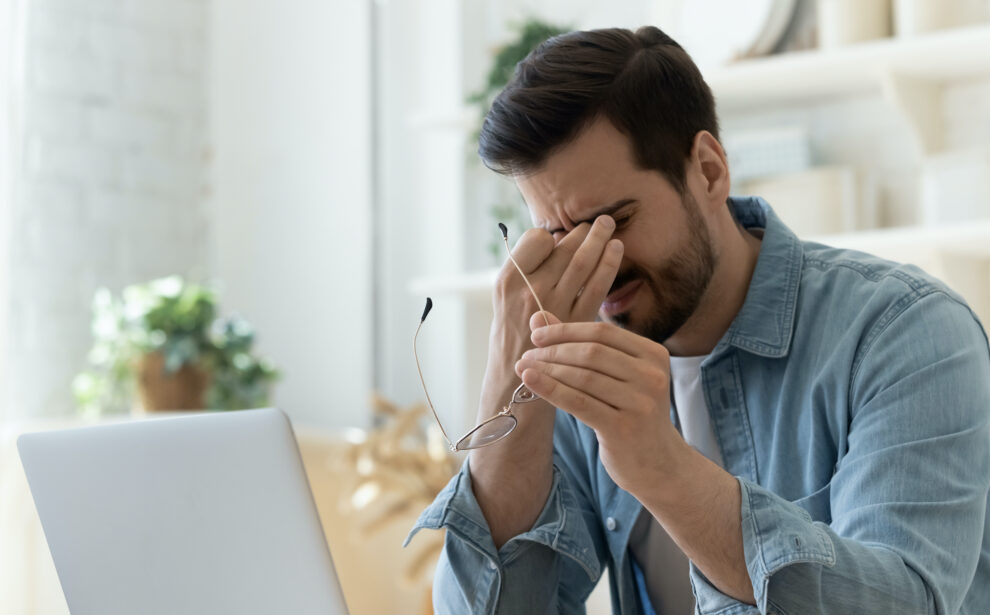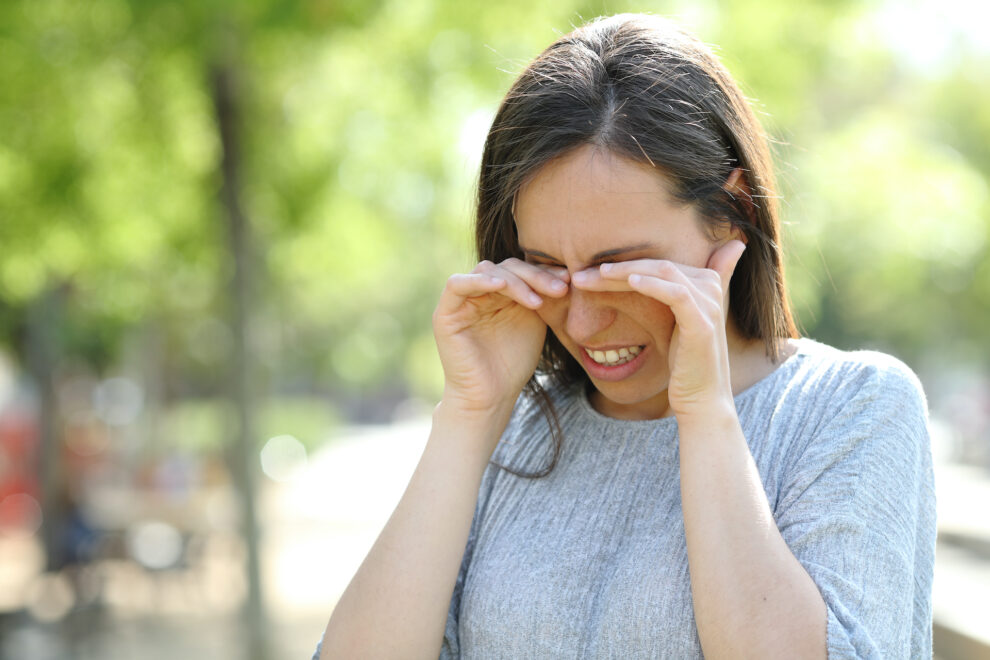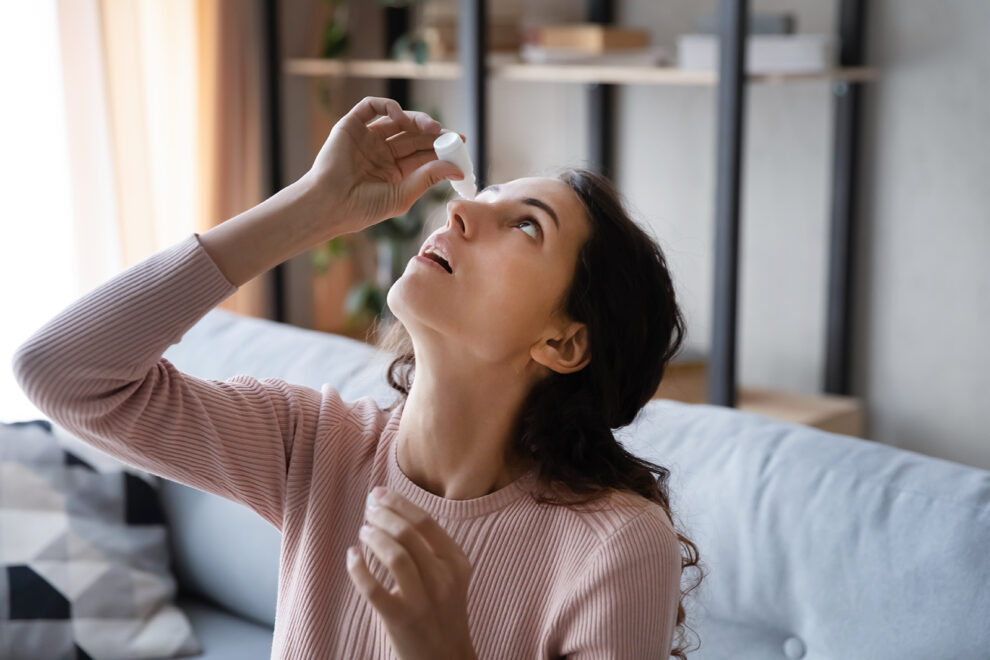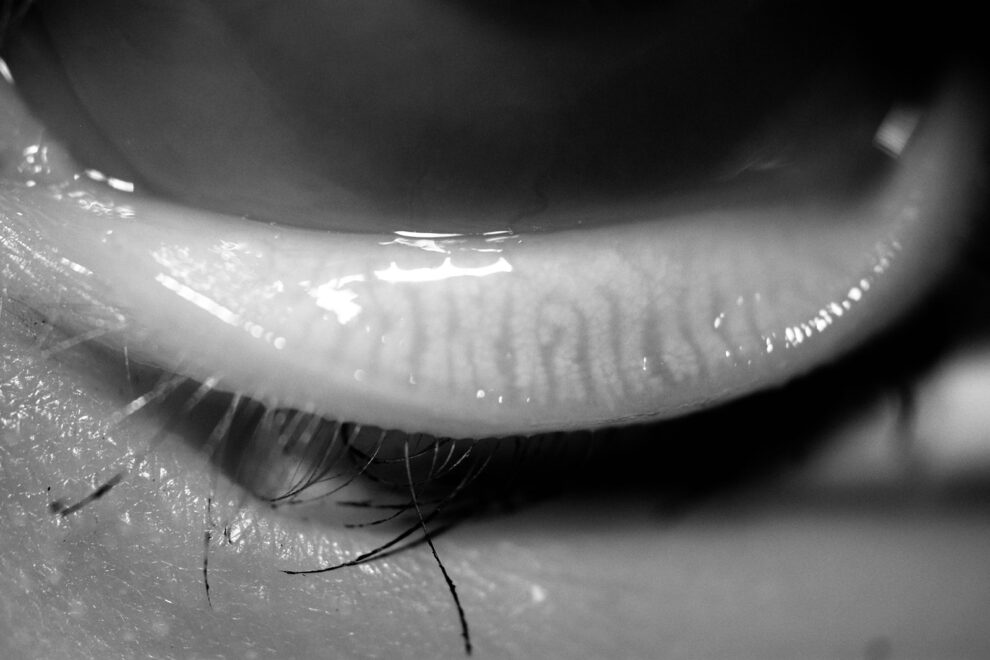Dry Eye

Dry Eye
Dry eye is a common condition that occurs when your eyes can’t produce enough tears, or the tears you produce aren’t of good quality. Tears are essential for lubricating your eyes, keeping them moist, and protecting them from dust and debris.
When your tears are insufficient or unstable, your eyes can feel dry, irritated, and uncomfortable. The team at Kitsap Eye Physicians can treat dry eyes and other eye conditions to help you get the relief you need.
What is Dry Eye?
Tears are a complex mixture of water, oil, and mucus that coat the surface of the eye, keeping it lubricated and smooth.
The watery layer of tears helps wash away dust and debris, while the oil layer helps slow down the evaporation of the tears. The mucus layer helps spread the tears evenly over the eye’s surface.
These different tear components work together in healthy eyes to create a stable tear film. However, an imbalance in tear production or composition can occur in dry eyes for various reasons.
What Causes Dry Eyes?
Several factors can contribute to dry eye, including:
Decreased Tear Production
Experiencing a decrease in tear production can happen for several reasons, including aging, certain medical conditions like Sjogren’s syndrome, or medications like antihistamines and antidepressants.
Increased Tear Evaporation
If you’re noticing an increase in tear evaporation from your eyes, this can be due to environmental factors like dry air, wind, or staring at digital screens for extended periods.
Medical conditions like blepharitis (inflammation of the eyelids) can also contribute to increased tear evaporation by affecting the oil glands in the eyelids.
Contact Lens Use
While contact lenses are a great way to improve and correct your vision, they can sometimes worsen dry eye symptoms, especially if you do not care for them properly.
How Do You Know If You Have Dry Eyes?

Dry eye can cause a variety of symptoms, including:
Diagnosing Dry Eyes
At Kitsap Eye Physicians, we can diagnose dry eye during a comprehensive eye exam. The exam may involve:
Discussing Your Symptoms and Medical History
During your eye exam, your ophthalmologist will ask you about your symptoms, any medications you’re taking, and your overall health.
Visual Acuity Test
A visual acuity test measures your vision at different distances.
Slit-Lamp Examination
During a slit-lamp examination, your eye doctor will use a special microscope with a bright light to examine the front part of your eye, including the eyelids and tear film.
Tear Production Test (Schirmer’s Test)
Schirmer’s test, used to test how many tears you’re producing, measures your tear production.
Osmolarity Test
An osmolarity test measures the concentration of salts and other substances in tears. In dry eyes, the tear film can become hyperosmolar (more concentrated), irritating the ocular surface.
InflammaDry Test
An InflammaDry test may be used to assess the level of inflammation in your eyelids, which can contribute to dry eye.
Treating Dry Eyes at Kitsap Eye Physicians
Fortunately, Kitsap Eye Physicians offers several treatment options for dry eyes. The best approach will depend on the severity of your symptoms and what’s causing them. Your ophthalmologist may recommend one of the following to treat your dry eyes or several treatment options, depending on their severity:

Prescription Eye Drops
Artificial tears are a common first-line treatment for dry eyes. They come in various formulations, including lubricating drops, gels, and ointments.
Lubricating eye drops provide temporary relief, while gels and ointments offer longer-lasting moisture.
Lifestyle Changes
Certain lifestyle modifications can help manage dry eye symptoms. These may include:
Reducing Screen Time
Taking regular breaks from digital devices like computers and phones can help reduce eye strain and evaporation of tears.
Using a Humidifier
Adding moisture to the air, especially in dry climates or during winter, can help prevent tear evaporation.
Warm Compresses
Applying warm compresses to your eyelids can help loosen and melt blocked oil glands in the eyelids, improving tear quality.
Omega-3 Fatty Acid Supplements
Omega-3 fatty acids, like those found in fish oil, may have anti-inflammatory properties and can be beneficial for some people with dry eyes. Your eye doctor may also recommend you eat more foods with omega-3 fatty acids, like tuna, salmon, or walnuts, to get the necessary effects.
Microblepharoexfoliation
Microblepharoexfoliation is an in-office procedure that gently exfoliates the eyelids to remove debris and unclog blocked oil glands.
Microblepharoexfoliation is an in-office procedure that gently exfoliates the eyelids to remove debris and unclog blocked oil glands.
Microblepharoexfoliation is an in-office procedure that gently exfoliates the eyelids to remove debris and unclog blocked oil glands.
Thermal-Assisted Meibomian Gland Expression
Thermal-assisted meibomian gland expression uses gentle heat and massage to express oil from the meibomian glands in the eyelids. Using this treatment can help improve the quality and flow of your tears.
Targeted Meibomian Gland Probing
In some cases, if certain meibomian glands are severely blocked, your ophthalmologist may use a very thin probe to gently open the blockage and allow oil to flow again. This procedure requires careful technique to avoid damaging the glands.
Addressing Underlying Conditions
If an underlying medical condition, such as Sjogren’s syndrome, is contributing to your dry eye, treating that condition can also help improve your dry eye symptoms.
Contact Lens Options
If you wear contact lenses and experience dry eyes, your eye doctor may recommend switching to a different lens material or wearing them for a shorter duration. Specialized contact lenses are also available for people with dry eyes.
Other tests we do in OSD clinic: Tear Osmolarity, Infammadry,
Other treatments: microblepharoexfoliation, meibomian gland expression, meibomian gland probing, punctual plugs, amniotic membrane placement, scleral lenses.

Working Together for Dry Eye Relief
Dry eye can be a chronic condition, but with proper treatment and management, you can find significant relief and maintain comfortable vision. At Kitsap Eye Physicians, we understand the challenges of dry eyes and are committed to providing you with personalized care and treatment options.
We’ll work with you to develop a treatment plan that addresses your needs and helps you achieve optimal eye health.
Taking Charge of Your Eye Health
Here are some additional tips for managing dry eye, including:
Regularly Schedule Eye Exams
Regularly scheduling eye exams is essential for monitoring your dry eye and ensuring your treatment plan is effective.
Follow Your Ophthalmologist’ Recommendations
Use your prescribed medications and follow your eye doctor’s instructions consistently for optimal results.
Practice Good Eyelid Hygiene
Keeping your eyelids clean can help prevent blepharitis and improve tear quality. Gently clean your eyelids with a warm compress and a mild eyelid cleanser, as your ophthalmologist recommends at Kitsap Eye Physicians.
Maintain a Healthy Lifestyle
Eating a healthy diet, getting enough sleep, and managing stress contribute to better eye health and potentially reduce dry eye symptoms.
Do you have dry eyes that haven’t responded to lifestyle changes or at-home remedies? Today, take the next step by requesting an appointment at Kitsap Eye Physicians in Port Orchard and Bremerton, WA!

